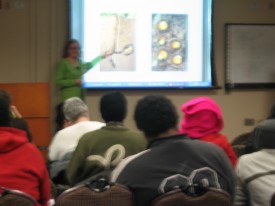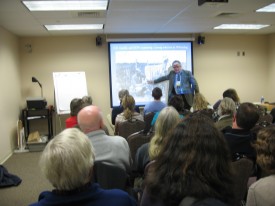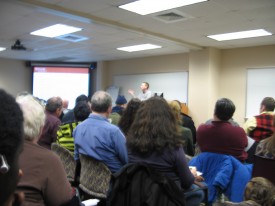
Rachael Winfree discusses the habitat of native pollinator ground-nesting bees.
The Northeast Organic Farming Association of New Jersey held its 23rd annual Food and Agriculture Winter Conference at Brookdale Community College in Lincroft, NJ, this January. Classes on a wide range of topics were presented to over 400 attendees, making it the largest NOFA-NJ Winter Conference, to date.
The two-day conference featured 50 speakers, 10 of whom are faculty from Rutgers New Jersey Agricultural Experiment Station. In addition, Executive Dean of Agriculture at Rutgers Robert M. Goodman presented an update on NJAES, titled “Advancing an Ecological Paradigm for Agriculture.”
The NOFA-NJ Winter Conference included approximately 64 classes and offered everyone the opportunity to network in the organic food and agriculture community right before the beginning of the growing season. Classes were taught by a broad range of farmers, gardeners, professors, food service professionals and food activists.
Keynote speaker Eliot Coleman, author, agricultural researcher and proponent of organic farming whose 1989 book The New Organic Grower is widely read by organic farmers and market gardeners, shared with attendees his own experiences in overcoming the challenges of four-season farming.
Rutgers Cooperative Extension (RCE) specialist Rachael Winfree, noted pollination ecologist, provided a below-ground view of dwellings for ground nesting bees as she discussed native pollinators that contribute to crop pollination–a concern for agriculture as honey bee populations decline.

Gary Pavlis shows historical documentation of the meticulous plant breeding in the Pine Barrens that developed into the commercial blueberry industry.
How do commercial blueberry growers keep birds from eating the berries? They don’t. Attendees learned from RCE Atlantic County agricultural agent Gary Pavlis that there are no flocking birds in the New Jersey Pine Barrens, but growing blueberries outside the Pines requires bird netting. Pavlis also gave an in-depth presentation on how the commercial blueberry industry was created in New Jersey.
Dealing with plant disease is a major concern of farmers and gardeners, no exception for organic growers. This was evident in the talk by RCE extension specialist Andy Wyenandt on managing diseases in organic vegetable production, presented to a standing room-only crowd. Another topic of great interest to conventional and organic growers alike was “Food Safety and Handling,” which covered by RCE agents Wes Kline and Meredith Melendez.

Andy Wyenandt discusses ways to organically controlling vegetable crop diseases.
SEBS grants facilitator supervisor Xenia Morin discussed the past, present and future of food labeling, while retired extension specialist Mel Henninger provided guidance on raising organic potatoes in New Jersey. rutgers Soil fertility specialist Joe Heckman gave a talk on the origins of the organic farming movement. Jack Rabin, NJAES associate director of farms program, familiarized attendees with the no-till Rodale Roller Crimper, which crushes a cover crop while leaving the soil intact.
Between sessions, conference attendees were able to ask questions of personnel from Rutgers NJAES Soil Testing and Plant Diagnostic Labs, which had set up exhibits at the annual NOFA-NJ Winter Conference.

